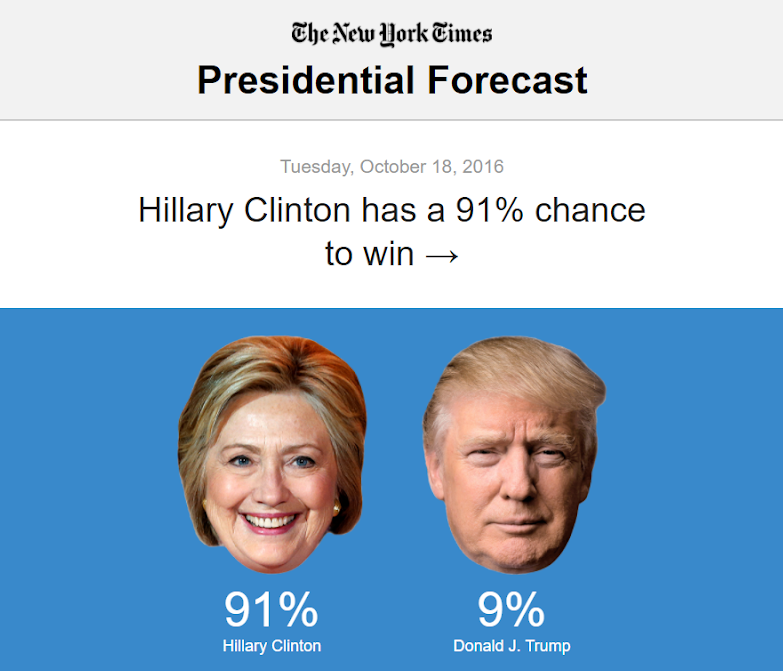Don’t Get Too Comfortable: Election Polling Inconsistencies
October 20, 2020
This time four years ago, the results of the upcoming presidential election seemed obvious — Clinton would win. Many Democratic Americans felt confident in the weeks leading up to Voting Day. As an 11-year-old, I went to bed thinking that I would wake up to America’s first woman president. The next morning, however, upon hearing the deafening silence that overtook my household, I knew otherwise.
This overconfidence in the predicted results led people to skip voting — why vote if you don’t like either of the two candidates and Clinton is going to win anyway? This thought process was irresistible, and although it’s frustrating that people would forego their right to vote, it did have merit. In the Presidential Forecast published by The New York Times on October 18, 2016, Hillary Clinton had a 91% chance of winning the election. That same week, ABC News released polling results, listing Clinton’s support at 50% and Trump’s at only 38%. While she did win the popular vote, it was only by 2%, a far cry from ABC News’ estimated 12%.
The cause of the substantial errors in the election projections is unclear, although nonresponse-bias is at least in part to blame. Nonresponse-bias is when survey results are skewed because they were not able to reach a certain group of people, so their responses did not come from a representative sample. Pew Research Center listed voters who had not obtained bachelors’ degrees as a sizable demographic of Trump’s victory in the polls, and these voters are generally harder to reach when it comes to surveying. According to the Census, only 33% of American adults have a college education, therefore the pre-election polling missing the voters who did not have college educations leave out a large portion of the country’s population, leading to inaccurate polling. This partially explains the drastic difference between the pre-election pollings and the actual results.

Researchers have made these types of errors before, but why haven’t they learned from their mistakes? In 1948, Harry S. Truman was up against Thomas E. Dewey in the Presidential Election, and the Chicago Tribune polling favored Dewey so much that they released an article with the headline “Dewey Defeats Truman” the night before the election was officially called. A now-famous picture shows Truman holding up that exact newspaper during his victory speech. The Tribune’s polling error was also due to an unrepresentative sample — their entire survey was done over the phone and, in the 1940s, phone owners were rich, and generally Republican, which was Dewey’s party. Ironically, four years ago, ABC News published an article with the headline “Clinton-Trump Probably Won’t Be The Next ‘Dewey Defeats Truman.’” Obviously, they were mistaken.
In October of 2016, it seemed preposterous that Donald Trump would become president, yet here he is in office. Again Biden is on course to win this election and it seems almost impossible that Trump would triumph again, given his most recent 42% approval rating. But we have to learn from our overconfidence in 2016. In a canvas released by the Pew Research Center on Friday, Biden maintains his lead in the polls with 52% support, compared to Trump who has 42% support. This ten-point lead is less than Clinton’s twelve-point percentage lead at the same time four years ago. The New York Times has not released their own presidential forecast this year, but cites similar statistics in their polling section. Like the previous election, there is no way to be sure that these numbers are coming from a representative sample.
We cannot be as worry-free as Americans were at this time in 2016. If you are over 18, exercise your right to vote whether it be through mail, casting your ballot early, or even going in person. If you are under 18, write postcards, make phone calls, or work at the polls if you feel safe doing so and are 17 years old. Whatever you do, don’t get comfortable. Election Day is 13 days away and every one of those days matters.








Pam Sharpe • Oct 21, 2020 at 3:53 pm
What a well-written, non-partisan piece! Thank you for doing your part to get out the vote, Eleanor!